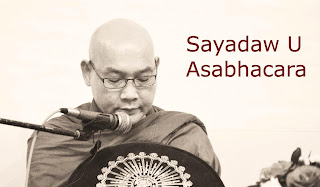The Teaching of Ajahn Suchart.
3 April 2024
Q: I really like Ajivatthamaka sīla (the four precepts from the 5-precepts plus 3 expansion precepts of the fourth precept and end with right livelihood) which is commonly practice in some Burmese groups and some people add mettā as the ninth precept.
Than Ajahn: I think you should stick to the Buddha's teachings. Don't add or subtract his teachings. His teachings are complete and perfect.
Svākkhāto Bhagavatā Dhammo. The teachings are all well thought by the Blessed One. No need to add or subtract anything from the teachings.
They are complete and perfect. What is lacking is your practice, to follow the practice completely and wholeheartedly.
Don't worry about the social issues.
This is the way of the world. It will happen regardless of when or where you are born.
You will face this social issue because these are the issues of the defilements. You can’t stop it. You just have to let it be. Everything is the natural phenomenon. The only thing you can do is for yourself. Extract yourself from this world. Rise above it.
Leave this world alone. Don’t worry about this world because you can’t control the world.
But you can control your defilements. You can stop your stress, your suffering. So do what you can, and don’t do what you cannot do because you’ll get frustrated if you do what you can’t do.
Don’t try to control things. Don't try to change things. Don't try to make things the way you want them to be.
But change your mind from being restless to being peaceful and calm, from being engaging to being disengaging. If everybody in the world is disengaged then the world would be peaceful and happy. Our problem is we try to impose our will on other people.
It’s better that you spend your time with meditation practice and leave the social issues alone. When you meditate, you’ll feel calm and happy, when you get involved with social issues, you’ll get agitated and restlessness so what do you want? Do you want peace and happiness or agitation and restlessness?
Student: I want peace and happiness but not only for myself. I want to be able to share it.
Than Ajahn: Who else can give you happiness if it isn’t yourself? Yes (you can share it) if other people are willing to accept your charity but if people don’t want to accept it what are you going to do? Are you going to force it upon them? Go to Supreme Court?
The Buddha would never go to the Supreme Court to ask the Supreme Court to apply the noble eightfold path to everybody. Would he do that if the Buddha is alive today? That’s the best way of living, the noble eightfold path.
So you just walk this path and if anybody want to follow the path then you help them if you know how to help them otherwise there’s nothing else you can do. There is nothing better than this path so it’s better to stick to this path, the path of charity, morality and meditation.
And consider that everything that is happening right now is all natural phenomena. People and things that are happening right now are all the work of nature. They are like the weather, things keep changing.
Everything changes. People change.
Opinions change. Whatever law people made today could change tomorrow because the laws are made by people.
Try to practice meditation and stay calm, peaceful and happy and then you can laugh at everything.
Everything that’s going on in this world is like a show. Don’t get involve with the show, just watch the show and enjoy yourself.
The show is created by nature. What’s going on - you, me and everything else - are part of the work of nature but due to our delusion we think that we are not part of nature, we think that we are ‘me,’ we are ‘the ego,’ we are people who can take control of things but we in reality we can’t take control of ourselves.
You can’t control your body. Can you control your body? Can you stop it from getting old, getting sick or dying? So everything is the work of nature. Can you stop the rain? Can you stop the storm? You can’t stop your body from getting old, getting sick and dying. So why are they different? If the sun and the rain are work of nature, why not your body and your mind? They are all work of nature.
It's your delusion. You separate your body and mind from the nature and think that you are not part of nature.
You think you can control nature, you think you can control your body so people invent so many things to keep the body healthy and strong but nobody can find a way to stop the body from dying, from getting old or getting sick. It’s like no one can stop the snow, the storm, or the flooding.
They come and go. These are all work of nature, so is with everything else like our body, our mind. That’s why the Buddha said, ‘Sabbe Dhamma Anattā.’ Everything is anatta (no self).
If you can see this, then you just watch the show, watch nature shows itself like you watch the rain and the storm. What else can you do except watching them?
This is the goal of our practice: to be able to just watch and let everything be. Then there will be no dukkha. As soon as you engage with things, you’ll get dukkha because sooner or later you will not be able to do what you want to do.
This is something to reflect and to think about.
“Dhamma in English, Jul 4, 2023.”
By Ajahn Suchart Abhijāto
Latest Dhamma talks on Youtube:
https://www.youtube.com/channel/UCi_BnRZmNgECsJGS31F495g



















